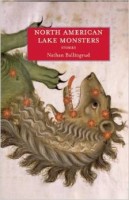Monsters From The Inside Out
I just read a terrific book — thanks to Sandra Katsuri, my publisher at Chizine Press, who recommended it to me — and I wanted to pass the word along.
The book is NORTH AMERICAN LAKE MONSTERS by Nathan Ballingrud.
This is a superb collection of short stories. Nathan Ballingrud won the inaugural Shirley Jackson Award for his story “The Monsters of Heaven” which is contained in this book along with eight others. Each might have won the award. They’re that good.
Let’s be clear. These are dark speculative stores about vampires and werewolves, ghosts and,in the case of the title story, lake monsters. If you are the sort of reader who likes the short stories of Cheever and Updike, be warned. (Although I am the sort of reader who likes Cheever and Updike and I loved this book, so keep that in mind.) What I mean is that these stories work figuratively with the monsters that are the territory of all great fiction — the monsters within. While it’s true there are specters and undead within these pages, in Ballingrud’s masterful hands, they are allegories to our own darkness, our own violence, our own unpredictability, selfishness and moral poverty.
On the back of the book, the publisher says they are love stories as well as being monster stories. This is true. Love lost. Love corrupted. Love perverted. Love ruined. Sometimes love redeemed.
The reader should expect to feel an uncomfortable sense of recognition with Ballingrud’s cast of desperate, extreme characters. They are, above all else, human. They are, above all else, us.
And the writing itself is fantastic. I encourage my writing students to describe characters in such a way that we understand who they are psychologically. Consider this example, from “S.S.”, a shudder-inducing story about a young neo-Nazi living in the American south:
He spotted Trixie coming down the steps and remained there until she strolled up to him. Her red checkered skirt and white blouse seemed absurd in the context of her closely shorn hair, the enticing hint of a tattoo looping down below her right sleeve and the openly confrontational stance she maintained with the school and just about everybody in it. She was a year older than he was, but to him it seemed as though she was from another, most sophisticated country, where people were cool and didn’t take any shit, and where they believed in themselves absolutely. That she had recently seen fit to spend time with him was a stroke of luck that very nearly compensated for his mother’s dismal condition.
What a great deal that passage tells about about all the characters, about who they are and not merely what they look like.
Then there is the woman suffering from a mental breakdown in “The Good Husband” who is described, in the psych ward, this way: “Visit her, try not to cry in front of her as you see her haunting that corridor with the rest of the damned, dwelling like a fading thought in her assigned room.”
And, from the same story, comes this passage: “Sounds rose from the earth. New sounds: cobwebs of exhalations, pauses of the heart, the monastic work of the worms translating flesh to soil, the slow crawl of rock. There was another kind of industry, somewhere beneath her. Another king of machine.”
Or consider the beauty of this language, juxtaposed against its subject matter, in the title story:
It had changed since this morning. It actually was shedding light, for one thing, though it was a dim phosphorescence, the result of some strange fungus or bacterium running amuck through its innards. The creature looked like some ghastly oversized nightlight. The gash that was either a mouth or a wound had borne fruit: a weird and vibrant flora spilled from it like fruit from a cornucopia, pale protuberances with growths like outstretched arms listing this way and that, a dozen vegetable christs. Life abounded here: small chitinous animals hurried busily to and fro, conducting their miserable business in tunnels and passageways in the body, provided for them by nature or their own savage industry; a cloud of insects, drunk on the very perfume which had driven him into fits, alternately settling on its carcass and lifting away again in graceful curtains, like wind blowing through a wheatfield.
Completely alien, and at the same time, completely familiar. Nathan Ballingrud is one hell of a writer. More please.

Sounds great. I like the excerpts you’ve included in your review, really well done. And your comments about these exceprts really help me undertstand the point you’re looking to highlight, such as: ” What a great deal that passage tells about about all the characters, about who they are and not merely what they look like.”
I read a lot of book reviews, and yours really stand out as being among that most thoughtful and well written of all of them… without giving too much away. I can imagine your mailbox is filling up from publishers and authors shipping books to you.
HI Fred, thanks for your comment. I’m glad you like the review. You’ll like the book even more. And yes, publishers do sometimes send me books, and I review for Truthdig.com and The National Post in Canada. However, if a publisher sends a book it’s not because they automatically expect a good review. I only rave about books I really love. The questions I ask myself when reviewing a book are: has the author’s intention for this book been met? If so, how? If not, why not? And, how should a reader approach the book? Who is the intended audience. A review that simply says, “I like the book a lot” or “I hated it” isn’t useful to either other readers or to the author.